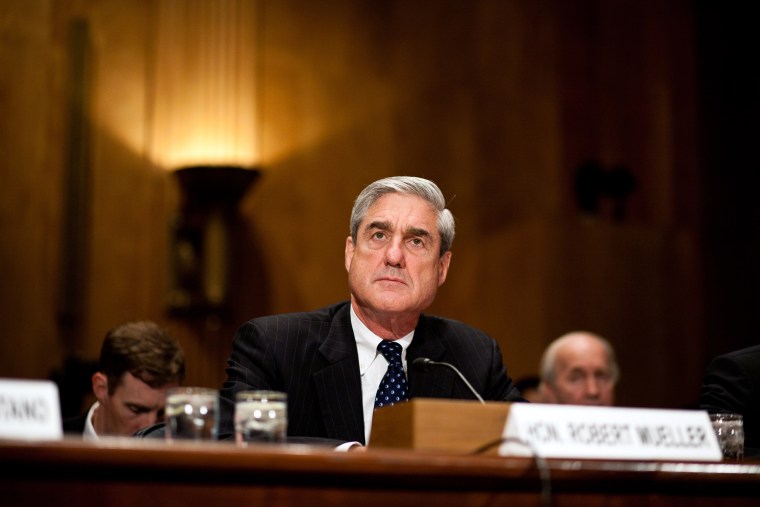WASHINGTON — The Senate Judiciary Committee voted Thursday to advance legislation designed to make it more difficult for any president to dismiss a special counsel, a signal to President Donald Trump amid Robert Mueller's ongoing Russia probe.
Four Republicans, including committee chairman Chuck Grassley of Iowa, voted with all 10 of the panel's Democrats to send the bill to the Senate floor. But Senate Majority Leader Mitch McConnell, R-Ky., has said he won't allow the full chamber to vote on it, saying in an interview last week, "We’ll not be having this on the floor of the Senate."
The legislation represents a compromise between Grassley and a bipartisan foursome who had long advocated the measure: Lindsay Graham, R-S.C.; Thom Tillis, R-N.C.; Christopher Coons, D-Del.; and Cory Booker, D-N.J.
The final version allows a special counsel fired by the attorney general or other senior Justice Department official to challenge the action in the U.S. District Court for the District of Columbia. It also would protect any and all documents relevant to the special counsel’s investigation during that legal challenge.
“It’s not about Mr. Mueller, it’s not about Trump, it’s about the rule of law,” Graham said at the hearing. “It’s about a system for today, tomorrow, and forever, that makes sure that nobody — even the President — is above scrutiny.”
The bipartisan action came after Democrats had feared Grassley was working on an alternative measure that would have watered down the sponsors' goals. The Iowan agreed to drop a provision he favored that would have required a special counsel to notify lawmakers each time changes were made to the scope of an inquiry, which Democrats feared opened the door to congressional micromanagement.
The final compromise would require the special counsel to submit a report to Congress at the conclusion of the investigation detailing his or her findings and explaining any prosecutorial decisions.
Arizona Sen. Jeff Flake joined fellow Republicans Grassley, Graham and Tillis in the final 14-7 vote.
The committee also defeated an amendment from Sen. Mike Lee, R-Utah, which reflected concerns among many Republicans that the legislation is unconstitutional. Though a 1988 Supreme Court decision upheld a now-expired law protecting special counsels from political interference, Lee cited the dissenting opinion from the late Justice Antonin Scalia as a signal of how a future court might rule on the new legislation.
Sen. Orrin Hatch, R-Utah, said prosecution was a “core executive function” that the legislation would infringe upon.
“Firing Mueller would cause a firestorm and bring the administration’s agenda to a halt. It could even result in impeachment,” he said during the hearing. “I think we’re right to convey a strong message to the president that he should not fire Robert Mueller. … But in seeking to protect Mueller and to impress upon the president the crucial importance of allowing the investigation to run its course, it’s important that we not overstep our constitutional authority.”
Sen. John Cornyn, R-Texas, the No. 2 Senate Republican, said a better approach would be to have the full Senate vote on a non-binding resolution calling on Trump not to fire Mueller. He said despite the committee’s action the full Senate would not take up the bill, the House was unlikely to pass it, and that Trump would never sign it.
Booker said he was confident that the measure was constitutional, but that ultimately lawmakers needed to act.
“Our job is to do the best we can in this moment in crafting legislation, and if this has to have a Supreme Court challenge, so be it,” he said.
The vote came just hours after Trump told Fox News that while he is staying out of the Russia investigation, he may "change" that approach at some point in the future.
Senate Minority leader Chuck Schumer, D-N.Y., called on McConnell to "immediately" bring the bill up for a full Senate vote.
"Given President Trump’s statement just this morning that he may interfere with the special counsel’s investigation, it’s become even more of an imperative that Leader McConnell put this bill on the Senate floor for a vote immediately," he said in a statement. "Rather than waiting for a constitutional crisis, the full Senate should act now."
